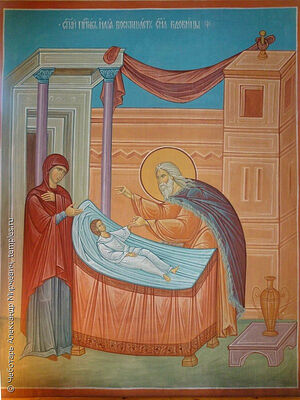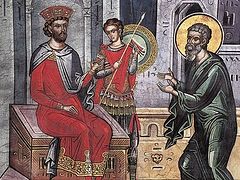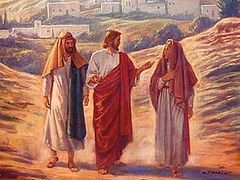Fear not; I am the first and the last: I am He that liveth, and was dead; and, behold, I am alive for evermore (Rev. 1:17-18). So, O Lord, You revealed to Your beloved Disciple. He who responded to Your love became a seer of mysteries. Love and fidelity are the doors of contemplation. St. John saw Your death. St. John was so close to the Cross that even Your quiet voice about his adoption by Your Mother was clearly heard. On the third day, having outrun St. Peter but not daring to enter, he meekly contemplated the empty tomb—it’s very silence testified to something extraordinary. And then he saw You along with the ten others.
What a joy this is—You are resurrected! The angels rejoice, people rejoice, the sun dances, and the universe itself, shining with ancient stars, seems to have changed, for the process of entropy has been interrupted—a link has fallen out of the chain of destruction.
***
 The Prophet Elijah raises the won of the Widow of Zarephath I used to think Your Resurrection was a miracle among other miracles. The world is filled with God’s miracles. But, alas, among those miracles mentioned in the Bible, resurrections aren’t so common: There are three in Old Testament times, and three in Gospel times before Thy Cross and Resurrection, and three after.
The Prophet Elijah raises the won of the Widow of Zarephath I used to think Your Resurrection was a miracle among other miracles. The world is filled with God’s miracles. But, alas, among those miracles mentioned in the Bible, resurrections aren’t so common: There are three in Old Testament times, and three in Gospel times before Thy Cross and Resurrection, and three after.
Your servant Elijah resurrected a young boy. In prayer, he stretched out over the lifeless body, calling out: O LORD my God, I pray Thee, let this child’s soul come into him again (3 Kg. 17:21). And although someone said that Elijah was a man subject to like passions as we are (Jas. 5:17), You accepted his bold prayer, and the boy revived. Elisha, who asked Elijah for a special grace for himself (4 Kg. 2:9), also performed a special resurrection. He called a boy to life—for there is no greater sorrow on Earth than the death of a child. How simply his revival is described: And the child sneezed seven times, and the child opened his eyes (4 Kg. 4:35). And the Prophet told his mother just as simply, but for her it was indescribably joyful: Take up thy son (4 Kg. 4:36). Another miracle was worked at the death of Elisha: And the bands of the Moabites invaded the land at the coming in of the year. And it came to pass, as they were burying a man, that, behold, they spied a band of men; and they cast the man into the sepulchre of Elisha: and when the man was let down, and touched the bones of Elisha, he revived, and stood up on his feet (4 Kg. 13:20-21). The bones of him who lived in obedience to the Living God raised up another dead man.
Thus, a trinity of resurrections enlightened those who were in the shadow of the Old Testament times. Nothing more is given. But faith in the Resurrection shone like an inextinguishable lamp in the souls of those of the Old Testament. That’s how it was, beginning with Abraham, who led his son to the mystery of the sacrifice in fear; for he believed that God was able to raise him up, even from the dead; from whence also he received him in a figure (Heb. 11:19), all the way down to the Maccabean Martyrs, one of whom said: It is good, being put to death by men, to look for hope from God to be raised up again by Him (2 Macc. 7:14). The future resurrection is spoken about in the prophets—Ezekiel, Daniel, and others—and a good bit in the Psalms. But they all awaited Him Who is the Resurrection and the Life. For those who believe in Him, though they die, they will live (cf. Jn. 11:25).
***
And then You came, having the keys of hell and of death (Rev. 1:18): Life, clothed in the nature of those who are dying every second. The Creator of everything descended in order to recreate everything; He Who created the ages—to grant the ages of eternity; the Ancient of Days—to endow us with immortal youth; He Who lives in unapproachable light—to illumine those sitting in the shadow of death.
 The raising of Jairus’ daughter
The raising of Jairus’ daughter
Life is life-giving—such is the property of Life; just as the sun shines, fire warms, and water quenches thirst. And therefore, You can’t but heal, comfort, and resurrect. During the brief time of Thy evangelical preaching, You revealed Your trinity of resurrections. You called the daughter of Jairus, the son of the Widow of Nain, and Lazarus the Four-Days-Dead forth from the darkness of voicelessness. For Your heart is merciful, unlike us; You feel the pain of parents, or of a single mother, or of sisters who love their brother.
In the first case, death had just touched a twelve-year-old girl; the color of her young skin hadn’t had time to change, and You Yourself, calming the grief-stricken parents, said: The damsel is not dead, but sleepeth (Mk. 5:39). In the second case, death visually manifested itself—they were already taking the dead one to be buried. And the sepulchral darkness would have put an end to it if the funeral procession, like a procession of death, hadn’t encountered the coming of Life at the gates of the small city of Nain—You were walking towards it, knowing in advance where the unfortunate mother would meet You, the Genuine Happiness.
In the third case, every tongue is silenced. For the four-day tyranny of decay, the kingdom of worms and bacteria, signified by the simple but understandable phrase, he stinketh (Jn. 11:39), was suddenly transformed into the fragrance of life from Life, Who shed tears over the tomb of His beloved friend.
But here I’ll say something that could even bewilder some. Death, this master over the end of all life, seeing such resurrections, only smiled condescendingly. It knew that the resurrected would die again after a little while! It only had to wait twenty or thirty years, maybe a little more. Its scythe would remain sharp, like a razor. Would anyone be found who could overcome it?
Death is devious and incredibly cunning. Sometimes it plays with a victim like a cat with a mouse—it lets it go for a while to then devour it again, seemingly forever. With the usual broad strokes, the scythe of death gathers its abundant harvest. But then something unexpected happened—the scythe of death hit a rock. That Rock was Christ (1 Cor. 10:4).
***
No one could have conjectured this, not even the beloved Disciple, who later became a seer of mysteries. But Your words are pure words: as silver tried in a furnace of earth (Ps. 11:7). You said: I lay down my life, that I might take it again. No man taketh it from me, but I lay it down of myself. I have power to lay it down, and I have power to take it again (Jn. 10:17-18). So You said, and so it was. For those who hate You tried to destroy the temple of Your Body, but in three days you raised it up (cf. Jn. 2:19).
You rose quietly—as quietly as an ear of wheat rises, being born from a dead grain; or as a butterfly quietly rises from the cocoon of a mortal caterpillar and strikes the eye with the delicate beauty of its wings. Everything that’s arranged by God ultimately ends not with destruction but with victory, with the restoration of the broken, and salvation. Having fulfilled the will of the Father to the end, You, O Son of God, emerged victorious, and selflessly grant this victory and resurrection to us, that we might become sons of God by grace.
But you arose not as others have arisen. For all were resurrected, returning to earthly life. But you resurrected, paving the way from the earthly to the Heavenly. The uniqueness of Your Resurrection is that you resurrected not for twenty or thirty years, not for half a century and then to die. You resurrected forever! The Apostle Paul wrote about it: Christ being raised from the dead dieth no more; death hath no more dominion over Him (Rom. 6:9). And this is our hope. For it is said that at the Second Coming, You will change our vile body, that it may be fashioned like unto [Your] glorious body (Phil. 3:21).




